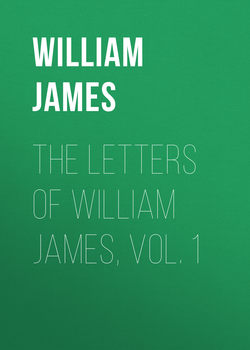Читать книгу The Letters of William James, Vol. 1 - William James - Страница 18
IV
1866-1867
ОглавлениеMedical Studies at Harvard
JAMES returned from Brazil in March, 1866, and immediately entered the Massachusetts General Hospital for a summer's service as undergraduate interne. In the autumn he left the Hospital and resumed his studies in the Harvard Medical School.
The Faculty of the School then included Dr. O. W. Holmes and Professor Jeffries Wyman. Charles Ed. Brown-Séquard was lecturing on the pathology of the nervous system. During the years of James's interrupted course a number of men attended the school who were to be his friends and colleagues for many years thereafter—among them William G. Farlow, subsequently Professor of Cryptogamic Botany and a Cambridge neighbor for forty years, and Charles P. Putnam and James J. Putnam—two brothers in whose company he was later to spend many Adirondack vacations and to whom he became warmly attached. Henry P. Bowditch, whose instinct for physiological inquiry was already vigorous, and who was destined to become a leader of research in America, and the teacher and inspirer of a generation of younger investigators, was another Medical School contemporary with whom he formed an enduring friendship.
The instruction given in the Harvard Medical School in the sixties was as good as any obtainable in America, but it fell short of what is nowadays reckoned as essential for a medical education to an extent that none but a modern student of medicine can understand. The emphasis was still on lectures, demonstrations and reading, and the pupil's rôle was an almost completely passive one. James, according to the testimony of one of his classmates, made a solitary exception to the practice of the class by attempting to keep a graphic record of his microscopic studies in histology and pathology. When questioned about this long after, he admitted that he believed himself to have been the only student of his time in the Medical School who took the trouble to make drawings from the microscopic field with regularity.
The teaching of Pasteur and Lister had not then revolutionized medicine. Modern bacteriology and the possibilities of aseptic surgery were yet to be understood. Surgeons who operated in the amphitheatre of the Massachusetts General Hospital could still take pride in appearing in blood-soiled gowns, much as a fisherman scorns a brand-new outfit and sports his weather-rusted old clothes. The demonstrations of even Dr. Henry J. Bigelow, a skillful operator who was then a leader in his profession, filled James with a horror which he never forgot.
On the other hand, the discovery of anesthesia, which made possible an enlarged and humane use of animals for experimental inquiry, and such illuminating reports and investigations as those of Claude Bernard, Helmholtz, Virchow and Ludwig were giving a great impetus to the investigation of bodily processes and functions, and a study of these was a possible next step in James's evolution. He had already been unusually well grounded in comparative anatomy by Agassiz and Jeffries Wyman. He was gravitating surely, even if he did not yet realize it clearly, toward philosophy. Whenever he more or less consciously projected himself forward, it must have seemed to him that the examination of processes in the living body, for which he was already prepared, might be related, in an enlightening way, to the philosophic pursuits that were beginning to invite him. Physiology therefore commanded both his respect and his curiosity, and he turned in that direction rather than toward what he then saw surgery and the practice of internal medicine to be.
During the winter of 1866-67 he lived with his parents in the house30 in Quincy Street, Cambridge, in which they had settled themselves, and worked regularly at the Medical School. He had come back from the year of mere animal existence on the Amazon in excellent physical condition.
Of the four letters which follow, two were written to Thomas W. Ward, who, it will be remembered, had been a member of the Amazon Expedition, and who, after getting back to New York, had entered the great Baring banking house of which his father, Samuel Ward, was the American partner. O. W. Holmes, Jr., will be recognized as the present Associate Justice of the United States Supreme Court. In no one did James find more sympathetic philosophic companionship at this period.
30
This house has since been enlarged and converted into the Colonial Club.
